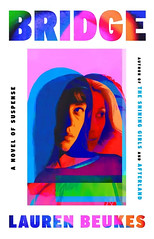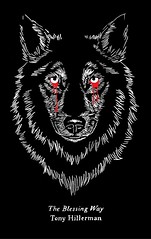 Bridge
Bridge
by Lauren Beukes
![]()
Lauren Beukes’ novels are radically different from one another, but all contain science fiction or fantastic elements: Moxyland, a Gibsonesque near-future novel of a South Africa where technology has been applied to repression; Broken Monsters, a contemporary police procedural (with supernatural elements) set in Detroit; Zoo City, a trip through the underbelly of Johannesburg (again with supernatural elements); Afterland, a post-plague near-future dystopia set in the U.S.; The Shining Girls, a novel of time travel and murder, also set in the U.S.
Bridge, Beukes’ latest, is also set in the U.S. From the biographical info on the jacket I learn Lauren now lives in London. Other Goodreads reviewers question whether she can still be considered a leading light of African science fiction. She’ll always be a South African author to me, though lately I see in her conceits more of the fantastic than the science.
The fantastical element here is the Dreamworm, which allows Bridge (and before her, her mother Jo), to inhabit other versions of themselves in alternate realities. It’s a fascinating premise, introduced early in the story and most satisfactorily developed as the story moves along. As Bridge learns more about her dead mother’s work and masters her reality-traveling techniques, we begin to realize that there are consequences to swapping realities with other versions of one’s self.
And we learn of other, more sinister characters who move between realities, determined to find and eliminate the new interlopers, Bridge and Jo.
A quick side note: I’m learning to accept they/them nonbinary characters in novels. Good thing, too, because there are more and more of them. Here, it’s Bridge’s friend and confidant Dom. After a few pages of initial confusion, looking for the other person who seems to follow in Dom’s wake, I readjusted my mind to see them as a single character. Dom is never fully physically described. Left on my own to imagine what they look like, I pictured a female-presenting person in a male body, probably because the Doms in my own life are male. Then, in one of the final chapters, Jo’s former assistant Caden, who doesn’t know Dom’s preferred pronouns, refers to them as she. That resulted in a major shift in my thinking. I suspect most readers form mental images of fictional characters and assign gender when it’s not made clear by the author. Much of the history between Bridge and Dom is off-page and implied. When I pictured Dom as male I imagined a wholly different past between them than I did after learning Dom is female. Maybe that’s on me, but I suspect most of us make gender-based assumptions about characters. Good on ya, Lauren, with that little twist!
But back to the book. I loved it, and as I’ve said in other reviews, if Lauren Beukes writes it, I’ll read it.
 Desert Star (Renée Ballard #5)
Desert Star (Renée Ballard #5)
by Michael Connelly
![]()
From my review of an earlier novel in Connelly’s current Bosch/Ballard series:
I’ve now finished [another] Renée Ballard/Harry Bosch novel, “The Night Fire” … I have not yet seen Renée Ballard make an appearance in the Amazon TV series, but still expect it. I like the way Connelly covers the older Harry Bosch, bad knees and all; I like Renée, her dedication and willingness to play the political game in order to get the job done and nail the bad guys. I like the apparent direction of the Ballard/Bosch series, the solving of cold case crimes.I didn’t give this one a 4-star rating because Ballard and Bosch get too many breaks in solving their cold cases. Too many gimmies, some of which didn’t seem realistic. But it is a gripping read, and I devoured the novel in two sittings and am now pressing it on my wife because I know she’ll love it.
Well, “Desert Star” earned a 4-star rating from me, despite the gimmies that fall Bosch and Ballard’s way in solving the cold cases at the center of this novel. It’s just so well-crafted. I admire Connelly’s still in telling a tale, and I’m inclined to believe the procedural details of police work his characters engage in.
As in previous Bosch/Ballard novels, current events & trends make an appearance: covid precautions are still in place; a break comes from the use of commercial genealogical data (23 & Me) to find a distant cousin of an unknown criminal who left traces of DNA at a crime scene. Also as in previous novels, Bosch continues to age, and the end of his character arc may be in sight. Ballard, who ages as well, is entering her prime years, and if Connelly’s own aging permits there may be more to come.
 Dead Lions (Slough House #2)
Dead Lions (Slough House #2)
by Mick Herron
![]()
From my review of Slow Horses, the first novel in Mick Herron’s Slough House series:
Espionage thrillers, good ones, are maps of their times: there was a noticeable shift between le Carré’s Cold War novels and those written after the collapse of the USSR; Herron starts with a post-7/7 London, another shift. And he’s good: the characters are believable and consistent to themselves, each with a background teased out as we go along; the plot is equally believable, as are the entirely believable insights into MI-5’s internal backstabbing politics … remarkable given Herron’s lack of background in England’s security services.
The first two Slough House novels, Slow Horses and Dead Lions, have been serialized on streaming television (available on Apple TV), with Gary Oldman in the role of Jackson Lamb. Both shows are faithful to the novels, more so than many television adaptations. I’ve watched both; now that I’ve read the second novel I see a few narrative differences between it and the show but not enough to change anything important.
As for the novel: it’s brilliant, funny, tense, and in parts a proper thriller. But also cozy, if that makes any sense. The characters, with the possible exception of a new exile from Regents Park, Shirley Dander, seem almost alive … and the characters from the first novel are by now becoming old friends.
I absolutely loved the cat’s tour of Slough House and its denizens that opens the novel, and the mouse’s visit that closes it. I actually read those out loud to my wife. To repeat myself: brilliant.
 The Blessing Way (Leaphorn & Chee #1)
The Blessing Way (Leaphorn & Chee #1)
by Tony Hillerman
![]()
My wife and I are streaming Dark Winds on AMC+, a drama adapted from Tony Hillerman’s Leaphorn/Chee novels. The show is excellent, with dramatic high desert backdrops, great acting, suspenseful stories, and what appear (to this white reader at least) to be worthy insights into Navaho culture and life in the Navaho Nation, not that far from where I live in southern Arizona, where Native American culture and history also abounds.
I had not read any of the novels, so decided to start with The Blessing Way, the first Joe Leaphorn/Jim Chee novel, or so the Amazon blurb promised. Well, Jim Chee fails to make an appearance here, but Joe Leaphorn does, and although Leaphorn kind of takes a backseat in the spills & chills department to a white anthropology professor, there’s more than enough Leaphorn to establish his character (and also affirm my impression that the producers of the TV series got it right).
I’m tending to write shorter reviews these days, particularly when it comes to older, widely-read books with successful television adaptations, so that’s about it for this one, except to say I’ll be reading more Tony Hillerman novels.
 Demon Copperhead
Demon Copperhead
by Barbara Kingsolver
![]()
A strong start. Kingsolver gives Demon a great voice and a compelling story. He’s eleven at the start of his narrative; more than half a long book later he’s advanced only as far as his sixteenth year, and then keeps the reader there for a painfully long time but I guess that’s okay because a lot of stuff happens when you’re sixteen, that is if your life revolves around the getting and taking of drugs, which his does. Oh, and willfully, determinedly remaining stupid and unambitious, in spite of the positive role models all around him (in the persons of June, Angus, Dick, Coach, his teachers, his grandmother, military recruiters, etc). Demon refuses to see beyond Lee County and the miserable life he’s always known and you know what? I realized I’d given up on him even before he got injured on the football field and got hooked on oxy. I gave up on him well before the redemptive final parts of the novel (which, unlike the earlier parts, I didn’t believe). Despite June saying to Demon and other addicts, over and over, that they didn’t do this to themselves, that rich people did it to them, they willingly go along for the ride. Because they’re stupid. And fuck them.
Yeah, I know this is subjective. It’s my review. This novel has earned praise, and your mileage will probably differ. Demon Copperhead depressed and repelled me. For context, as a 16-years-sober alcoholic, I can’t bear to be around, and have no sympathy for, people in the grip of alcohol or drugs. Not in life, not in movies, not in books. I should have put this novel aside the moment I saw the direction Demon’s life was taking.
 Small Mercies
Small Mercies
by Dennis Lehane
![]()
Small Mercies is a revenge thriller with a historical backdrop. There’s not a lot more to say. The backdrop is the imposition of compulsory busing to integrate Boston public schools. The characters are primarily white parents, kids, and gangsters in South Boston, bitterly opposed to busing and integration, more than happy to chant the n-word in mass protests.
Or to use it in daily life. To use it in front of Black people. To scream it as they chase down, attack, and bludgeon a Black teenager to death. To think it even as conciliatory words come out of their hypocritical mouths.
The people of Southie, Mary Pat in particular, think they’re special, that they stand together, support one another, and take care of their own. Which of course is horseshit. It’s every man and woman for themselves, and when Mary Pat needs support and solidarity not a bit of it is to be found. The people she counts on are the very ones keeping the truth about her missing daughter from her, maintaining a conspiracy of silence and misdirection.
Revenge makes up the second half of the novel. However unlikely this storyline may be (and it is very very), Mary Pat takes on the gangsters and single-handedly wipes out a good number of them. The only realistic part of this half of the novel is that she ultimately fails.
There’s a friendly cop. He doesn’t actually solve any of crimes at the heart of the story, and what little he does accomplish is only made possible through information provided by Mary Pat, who’s out there kicking ass and taking names.
It’s a grim story, livened up somewhat when Mary Pat goes to war.